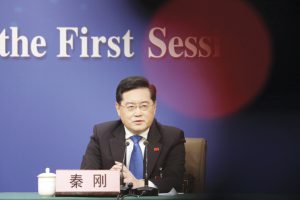BLOOMBERG
China’s new foreign minister warned that soaring US-China tensions risk blowing past any guardrails in the relationship, showing that divisions between the world’s biggest economies are becoming more entrenched.
“The US claims that it seeks to outcompete China but does not seek conflict,†Foreign Minister Qin Gang said on Tuesday at his first news briefing since taking office late last year. “Yet in reality, its so-called competition aims to contain and suppress China in all respects and get the two countries locked in a zero-sum game.â€
Washington’s approach towards Beijing “is a reckless gamble with the stakes being the fundamental interests of the two peoples and even the future of humanity,†he added.
Qin, who was previously ambassador to the US, blamed Washington for a wide range of problems in geopolitics and the global economy. He accused the US of creating a crisis over Taiwan, criticized the use of sanctions in Russia’s war in Ukraine and said Federal Reserve rate hikes caused capital outflows that have worsened debt problems in some countries.
Qin also pointed to America’s Indo-Pacific strategy, which he said is intended to “encircle China.â€
“The US Indo-Pacific strategy, which purportedly aims at upholding freedom and openness, maintaining security and promoting prosperity in the region, is in fact an attempt to gang up to form exclusive blocs to provoke confrontation by plotting an Asia-Pacific version of Nato,†Qin said. “No Cold War should be reignited and no Ukraine-style crisis should be repeated in Asia.â€
The remarks — coming with China’s most senior officials gathered in Beijing for the annual National People’s Congress legislative session — signal that tensions will likely continue to sour ties between the nations.
While a meeting between Presidents Joe Biden and Xi Jinping in November initially put relations on a steadier footing, with hopes that more senior-level talks would soon get underway, a crisis over an alleged Chinese spy balloon in February ensured that rapprochement didn’t last. The incident prompted Secretary of State Antony Blinken to postpone a planned trip to China, with no new date set. China said the US was overreacting to a weather balloon that blew off course.
When Blinken met his counterpart, Wang Yi, in Germany last month, the two traded barbs over issues including Taiwan, North Korea and potential Chinese support for Russia’s war in Ukraine. Biden has since said he intends to speak with Xi, but no date for that has been announced.
The US has stepped up its efforts in recent months to deny China advanced technology. National Security Advisor Jake Sullivan last year said the US was looking to maintain “as large a lead as possible†over competitors in certain technologies like advanced computer chips, noting that export controls “can be a new strategic asset in the U.S. and allied toolkit to impose costs on adversaries, and even over time degrade their battlefield capabilities.â€
Qin also touched on other hotspot issues in his presentation. In remarks that will be parsed in Washington, Kyiv and other capitals, Qin praised the country’s partnership with Russia and said those ties could become increasingly important if world becomes more unstable.
“China and Russia have found the path of major country ties featuring strategic trust and good neighbourliness,†Qin said.
Qin said China-Russia ties aren’t aimed at any third country and he criticised the “Cold War mentality†of other nations who see it as a threat — repeating a frequent criticism of the US. He didn’t respond to a question about whether Xi plans to visit Moscow, as Russian state-controlled media have reported.
Qin hit back at US warnings that Chinese companies have provided dual-use technology to Russia or that the government is considering military aid to Moscow.
“Between fanning the flames and lowering the temperature, we choose the latter,†Qin said. “China did not create the crisis, it is not the party to the crisis, and has not provided weapons to either side of the conflict, so why on earth the blame of sanctions and threats against China? This is absolutely unacceptable.â€
Qin repeated that Taiwan is a red line for China: “No one should ever underestimate the firm resolve, strong will and great capability of the Chinese government and people to safeguard its national sovereignty and territorial integrity,†Qin said.
 The Gulf Time Newspaper One of the finest business newspapers in the UAE brought to you by our professional writers and editors.
The Gulf Time Newspaper One of the finest business newspapers in the UAE brought to you by our professional writers and editors.
